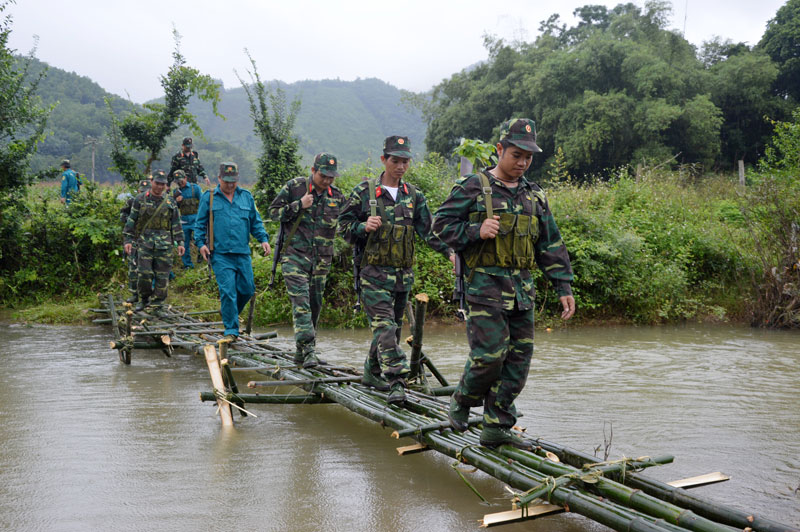
(HBO) – When the first military training class was held by Hoa Binh province’s Party Committee in early February 1945 with the participation of more than 30 soldiers, the provincial armed forces’ role as a pillar of the armed revolutionary movement was determined. Over the past 70 years, the provincial armed forces have carried forward their role and tasks.

Officers
and soldiers of the provincial armed forces are performing mass mobilisation
work in Du Sang commune, Kim Boi district.
Colonel Ha Tat Dat, head of the provincial Military Command, said
over the past years, the provincial armed forces have proven their important
role as trustworthy political forces and a firm pillar of all-level Party
Committees, authorities and ethnic groups in Hoa Binh not only in the fight
against invaders but also during national construction and defence.
The forces have effectively performed national defence work in
tandem with local socio-economic development by mobilising officers and
soldiers to join hands with local residents in building rural roads, irrigation
facilities and medical networks; participate in campaigns to reduce poverty and
support revolutionary contributors; and playing the core role in natural disaster
consequence settlement and search and rescue operations.
The armed forces have participated in constructing 122km of road,
134 public facilities, 69 sewers and 36 water containers, and dredging 22km of
canals.
Besides, they successfully built 19 models of culture-national
defence villages, built and upgraded 86 houses for social policy beneficiaries,
presented 764 bicycles to underprivileged students, and provided support for 97
poor children to pursue schooling.
With strong public support,
the provincial armed forces can overcome all challenges to successfully
complete their tasks of national construction and defence. This is also the
lodestar for the provincial armed forces at present and in the time ahead.
The emulation movement "Hoa Binh joining hands to build new-style rural areas” has been widely spreading, becoming a driving force that motivates the localities to renew rural landscapes and improve the material and spiritual lives of the residents. In this movement, the people play a central role-both as the main implementers and direct beneficiaries of its outcomes.
In response to the global digital revolution, Hoa Binh Newspaper is transforming itself into a modern and multi-platform media hub, blending cutting-edge technology with a restructured newsroom and a new generation of tech-savvy journalists.
Hoa Binh province’s Association of the Elderly recently held a conference to review the project on expanding the inter-generation self-help club model until 2025.
In a move to implement Resolution No. 57-NQ/TW, issued on December 22, 2024 by the Politburo, which targets breakthroughs in science-technology development, innovation, and digital transformation, the Hoa Binh provincial Department of Health has issued a plan to roll out the "Digital Literacy for All” campaign within the local health sector.
An Nghia Commune (Lạc Sơn District) is one of the communes that achieved the tha standard of the national new rural area in 2018. Entering a new development phase, the commune is now trying to meet the criteria for the advanced new rural development. With the strong political will and the public consensus, the commune is gradually overcoming the challenges to reach this goal, aiming for the sustainable development.



